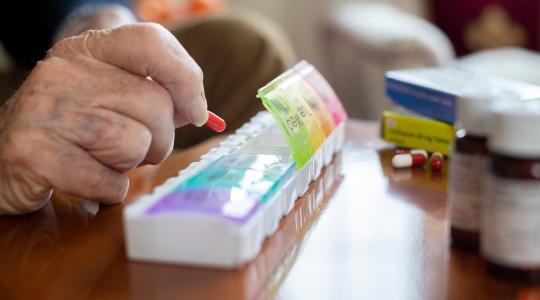While there’s no guaranteed way to prevent breast cancer, there are some things you can do to lower your chances of getting it.

About 1 in 8 women will get invasive breast cancer during her lifetime. But research shows that making healthy lifestyle changes can lower your breast cancer risk. And you don’t have to make these changes on your own. Your healthcare provider can help you get the resources you need. They can also recommend screenings that detect breast cancer early when it is easier to treat.
Make an appointment with your provider today to discuss your breast cancer risk factors and screenings.
Risk factors you can’t change
Risk factors increase your chances of getting a disease. Some breast cancer risk factors you can’t change. Those that are not in your control include:
- Age: Your risk increases once you’re older than 50.
- Early onset of menstruation or late menopause: Starting menstrual periods before age 12 or starting menopause after age 55 can raise your risk of breast cancer.
- BRCA1 and BRCA2 gene mutations: If you have one of these gene mutations, you have a higher risk of breast cancer and other types of cancer. Genetic tests can find these mutations so you can plan the next steps in your care.
- Exposure to the drug diethylstilbestrol (DES): Until 1971, doctors prescribed DES to some pregnant women to prevent miscarriage. You have a higher risk of breast cancer if you took DES or your mother took DES while pregnant with you.
- Family history of breast or ovarian cancer: If you have a first-degree relative who had either of these cancers, you have a higher risk of breast cancer. A mother, sister or daughter is a first-degree relative.
- Having dense breasts: Women who have dense breast tissue are more likely to get breast cancer. It’s also harder to see cancer on a mammogram if you have dense breasts. Your doctor can tell you whether your mammogram shows dense breast tissue and whether you need additional screenings.
Your health history also affects your breast cancer risk:
- Previous radiation treatment: Women who had radiation treatment to the chest before age 30 have a higher risk of getting breast cancer later.
- Personal history of breast cancer: If you’ve already had breast cancer, you have a higher risk of getting it again.
- Personal history of breast diseases: If you have had atypical hyperplasia or lobular carcinoma in situ, your breast cancer risk is higher.
If you have any of these risk factors, don’t panic. Your healthcare provider can partner with you to ensure you’re getting the screenings you need based on your risk level.
Lower your risk of getting breast cancer
Though you can’t change some breast cancer risk factors, many others are in your control. And you can start making changes immediately to lower your breast cancer risk.
Work toward a healthy weight
You have a higher risk of breast cancer if you carry excess weight, especially if you are past menopause. Extra body fat raises breast cancer risk because it increases estrogen and insulin in the body.
Diet changes can help you achieve a healthy weight. Try to eat more vegetables, fruits, whole grains and legumes. And eat less red meat, sugary drinks and processed foods.
Losing just a few pounds can boost your health. If you need help losing weight or don’t know how to start, talk to your healthcare provider.
Exercise regularly
Regular physical activity lowers your risk of getting breast cancer and other diseases, such as diabetes and heart disease.
The Physical Activity Guidelines for Americans, from the U.S. Department of Health and Human Services, recommend 75 to 150 minutes of moderate intensity exercise each week. That’s about 30 minutes a day, five days a week. If you don’t have time for 30 minutes a day, break it up into 10- or 15-minute chunks.
Limit or avoid alcohol
Drinking alcohol in any amount increases your risk of breast cancer. Avoid alcohol completely for the lowest risk. If you choose to drink, have no more than one drink per day.
Know the benefits and risks of HRT
Women who use hormone replacement therapy (HRT) that contains estrogen and progestin have a higher breast cancer risk. These hormones also make it harder to find breast cancer on a mammogram. When you stop taking HRT, however, your risk goes back down within three years.
If you need HRT to manage menopause symptoms, talk with your healthcare provider. Together, you can discuss the risks and benefits. In general, it’s best to take HRT at the lowest dose for the shortest amount of time.
Don’t smoke — or get help quitting
Women who smoke have a higher risk of breast cancer and other cancers. If you smoke and need help quitting, talk with your healthcare provider. In addition, many health plans offer smoking cessation programs.
Your provider is your partner in good health
Even if you have risk factors you can’t control, a healthy lifestyle can lower your risk of breast cancer. Combine these changes with regular screenings to help catch breast cancer early.
Your doctor can talk with you about your risk level and the right screenings for you. Together, you can fight breast cancer and live your healthiest life possible. Contact your healthcare provider to get started.
Sources: American Cancer Society, Breastcancer.org, Centers for Disease Control and Prevention, International Journal of Epidemiology



